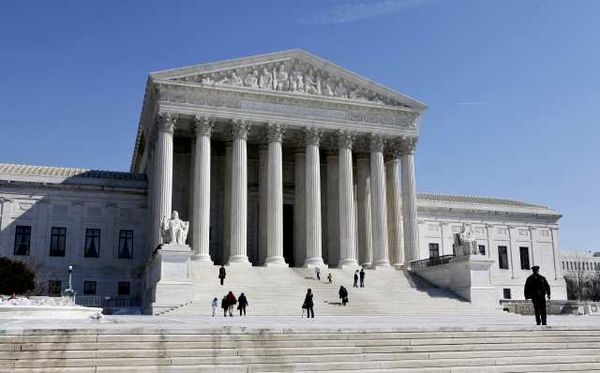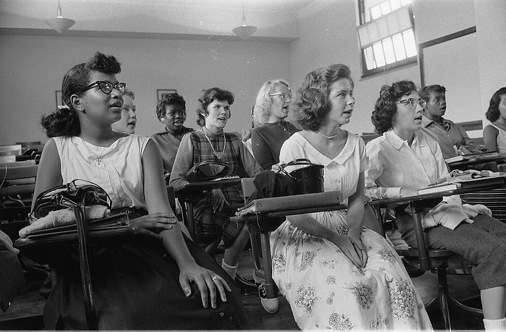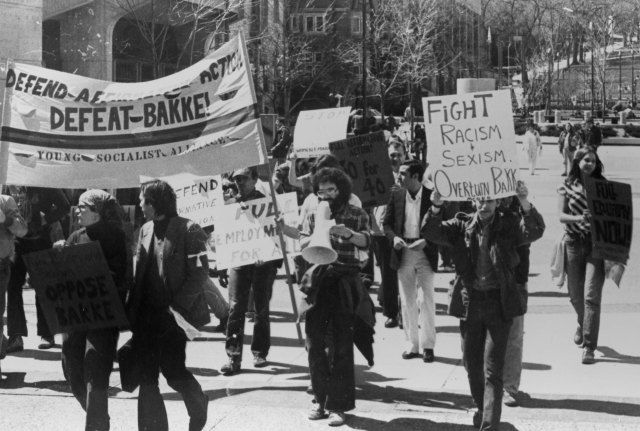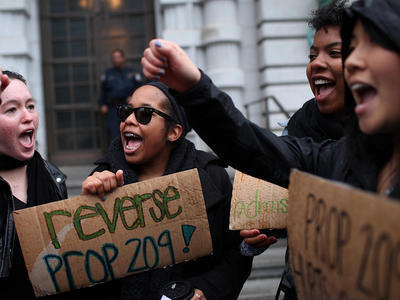This past Tuesday, the U.S. Supreme Court announced that would hear an appeal challenging the University of Texas’ affirmative action program. The appeal came from a student, Abigail Fisher, who claimed affirmative action constituted a “racial preference” in the college admissions process — she claims that she was not accepted at UT because she is white. In her statement, she mentions that her grades and test scores “exceeded those of many of the admitted minority candidates,” according to the LA Times, and she subsequently sued the University “alleging racial discrimination in violation of the Constitution’s guarantee of equal protection of the laws.”
Affirmative action is a very tricky issue to talk about. It’s deeply and complexly tied to race and a dynamic places minority against majority — people of color compete for spots in colleges against white people, and are considered by a different set of criteria than white individuals. The categories of “white” and “people of color” have never been stable categories, either — affirmative action policy now counts African-American and Latino-American students as individuals benefitting from the race-based admissions policies, but Asian- and Pacific Islander-American students are not. How were these decisions made? And why are they being challenged now?

The history of affirmative action begins with the first official Supreme Court ruling in 1978, in Regents of the University of California v. Bakke. But in order to get a bigger picture of how race is tied to this issue, we have to go back further — to1954 and the civil rights case Brown v. Board of Education. In this Supreme Court case, the court voted unanimously that segregated schools were unequal and that they violate the same law that Fisher is using to challenge affirmative action at the University of Texas: the Equal Protection Clause in the 14th Amendment. After Brown v. Board of Education, schools began a process of desegregating their students, which, according to PBS, opened “the door for affirmative action policies.”
The political face of the desegregation effort turned up again in 1974 when California State Legislature passed a proposal insisting that University of California match “the racial composition of its student body to that of each year’s graduating high school class in the state,” according to PBS. By guaranteeing space in their universities to minority applicants who were legally discriminated against before Brown v. Board, the legislature was replacing old race-based policies with a new, better-intentioned one. The high school and university ratios were supposed to match “by 1980,” but the process was never completed due to the large number of court cases challenging this proposal (and others like it) throughout the ’70s and into the present day.
Since 1974 the public debate over affirmative action has extended beyond the black and white binary addressed in Brown v. Board. Many of the cases about race and admissions in the past few decades concerned questionable admissions policies that restricted the number of Asian/American students admitted at top universities — an interesting development, since Asian/Americans were originally among the populations positively affected by affirmative action. In 1978, the Supreme Court ruled in Regents of the University of California v. Bakke that the UC Davis Medical School was unconstitutional in using quotas and reserving seats for “disadvantaged” students, which then included “blacks, Latinos, American Indians and Asian Americans,” according to PBS, while agreeing that race could be used as a factor in admissions policies.

Ten years later in 1988, university admissions policies were questioned again. The US Department of Education set out to examine the admissions policies at Harvard, UC Berkeley and UCLA. The Department had noticed some odd statistics — a “sharp drop in the percentage of Asian admissions at UC Berkeley” happened “early in the decade, even though a higher percentage of Asians met UC’s eligibility requirements than applicants from any other racial or ethnic group,” according to PBS. In 1989, UC Berkeley’s Chancellor, Ira Michael Heyman, apologized for the policies that had led to the decline in Asian/American student enrollment, and the school decided to redesign its admissions policies so that more weight was put on academic performance.
According to PBS, “The change is largely in response to earlier complaints that the university put too much emphasis on extracurricular activities and other subjective criteria in an attempt to limit admissions of Asian students.”
UC Berkeley’s admissions system was using a racial stereotype that’s uncomfortable to look at — the stereotype that Asian/American students test well academically but can be found lacking in anything not learned by rote memorization. It’s a stereotype that still has cultural currency today. The uncomfortable part is that this stereotype sometimes holds true, and UC Berkeley was successful in using it to keep Asian/American students out.
This was not the first time that a university used subjective criteria to weed out candidates based on race or ethnicity. As Malcolm Gladwell writes in the essay, “Getting In: The Social logic of Ivy League Admissions,” a powerful early 20th century anxiety about Jewish students overwhelming elite schools like Harvard led to drastic changes in the process of college admissions.

“Lowell [Harvard’s president at the time] … realized that if a definition of merit based on academic prowess was leading to the wrong kind of student [that is, Jewish students], the solution was to change the definition of merit,” Gladwell writes.
Applicants were asked to supply a greater pool of personal information than ever before: letters of personal reference, photographs, and personal essays listing extracurricular activities as well as answers to questions about “race and color,” “religious preference,” “maiden name of mother,” “birthplace of father” and any name changes that might have occurred to the applicant since birth. The private lives of students became crucial to the admissions process in an effort to keep out Jewish applicants through genealogy, family history, and other personal information.
College applications still ask for this personal information today, and the information collected still has an effect on race and college admissions — take the 2011 article that found mixed-race Asian/American students with ambiguously raced last names were not listing their race in college applications, hoping for a better shot at getting in. These well-known admissions questions started as a way to keep out students of certain ethnicities and races out, and after all these years, they are still doing what they were designed to do, secretly or not-so-secretly.
But what does this have to do with affirmative action? Everything. Because while affirmative action might just seem like just a liberal-minded way to get more minorities into college, the system is deeply influenced by the methodology of racial segregation. Before Brown v. Board, the purpose was to keep minority students out, and the purpose now is to invite them in, but the power dynamic — elite, largely white college officials deciding who gets in, who stays out, and what the numbers are — has stayed the same.

Affirmative action policies do help individual minority students, but they also support the status quo so that the majority stays the majority, which we can see in college admissions statistics. According to the Boston Globe, “University of California system moved to a race-blind system 14 years ago,” which results in schools like University of California Davis and University of California Irvine having about 29- and 15-percent white students, respectively, in the first-year class, while Ivy League schools that do not participate in by race-blind admissions but do participate in affirmative action, like Harvard and Princeton, have about 44- and 49-percent white students in the freshman class, respectively. The gap is about twenty percent — a notable amount.
The term “minority,” stays an unstable category, though. Not all racial and ethnic minorities are eligible for the “help” of affirmative action, and the definition of “minority” has changed over time include certain groups and exclude others. From Harvard’s exclusion of Jewish students in the ’20s to UC Berekeley’s cap on Asian/American admissions in the ’80s, some groups’ upward mobility has been threatening enough for schools to develop policies to keep these students out.
The language of people challenging affirmative action, too, is interesting — from Allan Bakke of Regents of the University of California v. Bakke in 1978 to Fisher in 2012, white students challenging affirmative action in the courts have appropriated the rhetoric of anti-racist activists to make their cases. Both Fisher and Bakke looked for support in the Equal Protection Clause of the 14th Amendment, the same clause used to support Brown v. Board of Education. It gets tricky here, too — these are white individuals in positions of power, who have the money and knowledge of resources to sue entire establishments, which is not a privilege many individuals have, especially people of color. The phrase “discriminate[d] … on the basis of race,” present in both Bakke and Fisher’s court documents, has a very different significance in this context.

Affirmative action is a policy that stems directly from the racism that caused schools to be racially segregated, but the racism affirmative action is trying to correct, for better or worse, isn’t really discussed. Instead it turns into a dynamic of universities “helping” minority students get into schools on terms created by a privileged majority. The focus hones in on this uncomfortable act of “charity” to minorities instead of acknowledging the racial and structural inequality that exists in the country and its public school systems — and the reasoning seems to be that by offering minorities of certain races a better chance at higher education, the playing field will be leveled and the effects of institutional racism and structural inequality will somehow be nullified.
Or maybe the playing field is already leveled — maybe we’re living in a post-racial society where racism and discrimination are non-issues. That, at least, is what the recent court challenges to affirmative action seem to assume.
The last time affirmative action was considered in the Supreme Court prior to Fisher v. University of Texas was in the 2003 case, Grutter v. Bollinger — in this case, the court approved of using certain kinds of race-based consideration when selecting students for upper education. In Justice Sandra Day O’Connor’s closing statement, she remarked,
“It has been 25 years since Justice Powell [in Regents of the University of California v. Bakke] first approved the use of race to further an interest in the context of public higher education … We expect that 25 years from now, the use of racial preferences will no longer be necessary to further the interest approved today.”
Instead, it’s an unexpectedly short nine years. And now, according to the LA Times, this latest appeal “is likely to have a national impact” — it might be the case that ends “the high court’s more than three decades of decisions allowing affirmative actions.”

With Day having been replaced by Justice Samuel Alito just two years after the University Regents v. Bakke ruling, it seems like this might be the last time we’ll see affirmative action in courts or anywhere. Depending on how the court rules in the case of Fisher v. University of Texas, it’s possible that it will become illegal for universities that receive public funds to take race into consideration during the admissions process. It’s also possible that schools like the University of Texas which have a “top ten policy,” in which students who place into the top 10% of their high school class are guaranteed admission, will be told that they can’t justify race-based affirmative action if their top ten policy has already given them a diverse student body. (Fisher’s grades did not place her in the top 10% of her high school class, but she argues that her grades were still higher than “many of the admitted minority candidates.”) It’s not certain that we’ll see affirmative action laws change, but the current makeup of the Supreme Court tells us that we might. Elena Kagan, generally considered one of the more liberal voices, has recused herself from the case because she worked on a brief related to the case while it was in a lower court. That means one liberal vote is lost against votes from justices like Scalia and Alito. According to the Huffington Post, in 2007, Alito struck down “affirmative action programs in public high schools in an opinion that concluded, ‘The way to stop discrimination on the basis of race is to stop discriminating on the basis of race.’”
This is where Alito’s wrong — ending America’s history of racism is not that easy. College admissions are deeply entwined with race and a historical effort to control people of minority races — whether it’s through who gets into college, who doesn’t get in, or how many of people of certain races and ethnicities do. And since popular wisdom has it that higher education functions as the doorway to a career in an increasingly harsh economy, affirmative action also becomes a question of who we allow to access a certain level of income and socioeconomic status. It’s a complicated system that reflects an uncomfortable racial balance that America has been trying to rectify since Brown v. Board of Education. While affirmative action is doing what it set has set out to do — get minorities in to college — it still reflects the complicated and developing relationship America has with race and the educational system, and the way that institutionalized power discrepancies tend to play out in it. As an LA Times editorial mentions, “Despite the emergence of a black middle class [due in part to affirmative action], stark inequalities in income and education persist.”
While affirmative action has tried to fix some problems of inequality, we are far from the point of having fixed everything. And with Fisher’s case making it to the Supreme Court, we move to the next step of the complicated intertwining of race and the educational system in America — which apparently consists of trying to disentangle them entirely. It’s up to the Supreme Court to decide whether the University of Texas’s policies (and possibly those of many other universities) are in violation of the Equal Protection Clause. But no matter what previous cases’ rhetoric may have been, white students like Fisher aren’t the ones who have traditionally needed to rely upon the Equal Protection Clause — and even with affirmative action in place, students (and all people) of color still suffer systematic discrimination. That won’t go away with this case. Telling universities they can’t consider race in admissions decisions won’t make mean that race is no longer a factor in academia or in life, or absolve us of our responsibility to work towards equal access to education and to success regardless of ethnicity and class. Hopefully our commitment to that process can be strengthened by whatever happens in the case of Fisher v. the University of Texas, and we can move towards a system that doesn’t hinge on a privileged majority granting or denying access to social or academic institutions to an underprivileged minority. Then we could really say we’ve won something.







